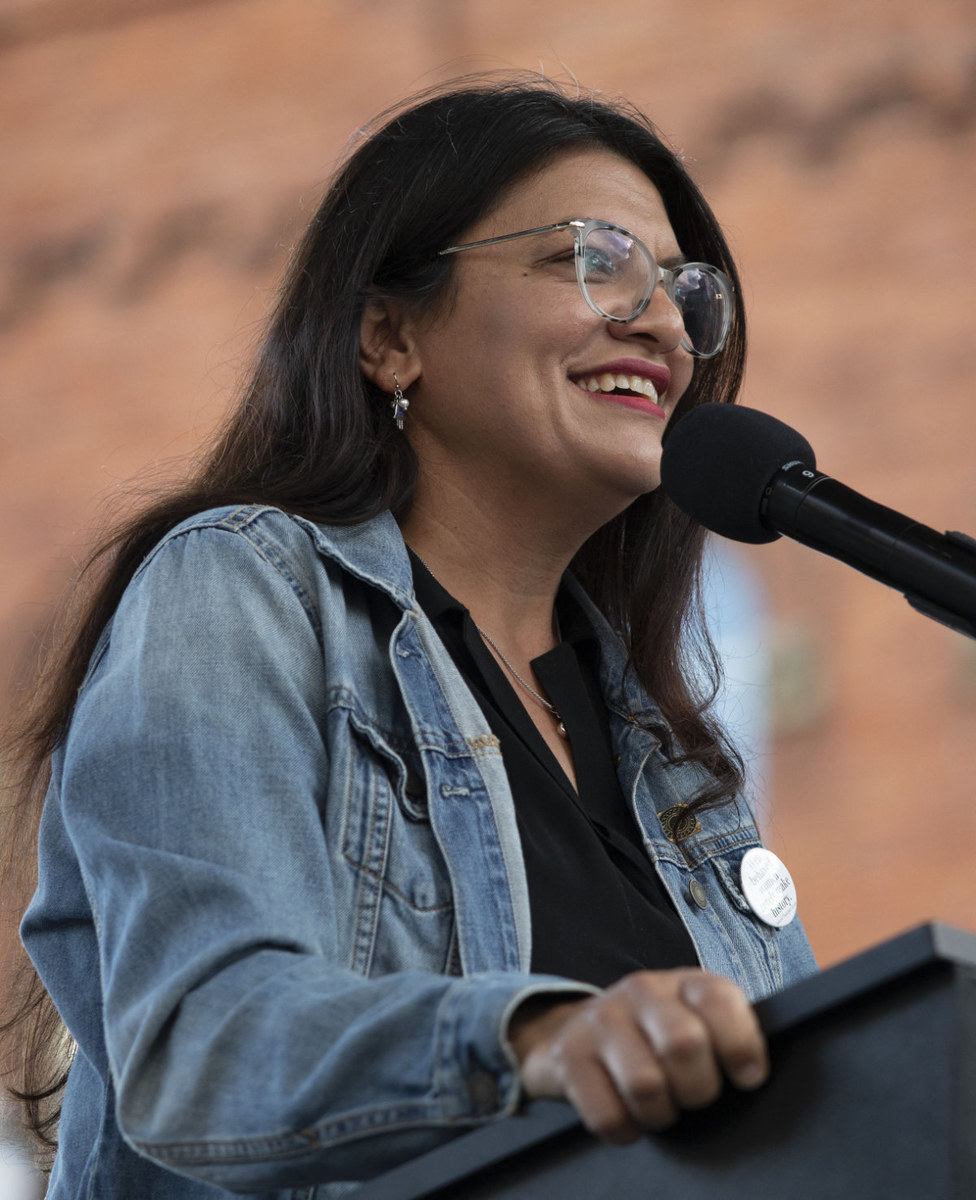CHICAGO: Republican candidates fell far short of the election sweep that GOP leaders had predicted would occur on Tuesday, but Arab and Muslim Americans increased their election presence in several US states.
Some Arab and Muslim candidates, from California to New Hampshire, faced stiff challenges while a few lost their election bids.
Here is an overview of how Arabs and Muslims performed in election contests in several key American states, based on unofficial results that were released by election authorities or tabulated by major media.
Popular American TV host and Republican Dr. Mehmet Oz failed in his bid to become Pennsylvania’s first Muslim-American member of the US Senate when he lost by a narrow margin to Democrat John Fetterman. However, Arab and Muslim candidates in Minnesota, Illinois, Louisiana, Iowa, Michigan, New Hampshire, Florida and California won contests and strengthened their voices.
In Minnesota, Attorney General Keith Ellison held a narrow lead in his re-election bid to retain his title as the nation’s only Muslim attorney general against Republican Jim Schultz. With 95 percent of the votes counted, Ellison clings to a narrow but significant 20,000 vote lead in an election that drew more than 2.5 million votes.
“This election really was tough. Fear, division, the nasty commercials, millions of dollars spent just to sow hate, division and fear. And you know what, we overcame it. The votes are still being counted, but we will win this election,” Ellison told supporters early Wednesday morning, according to the Star Tribune Newspaper.
Ellison’s congressional colleague, US Rep. Ilhan Omar, a Somali-American Democrat, easily won re-election over Republican Cicely Davis, carrying 75.2 percent of the state’s votes in the 5th Congressional District.

US Rep. Ilhan Omar speaks to the crowd at the Minnesota Democratic Farmer Labor Party's election night party in St. Paul, Minnesota, after winning reelection on Nov. 9, 2022. (AP)
In Illinois, voters elected Palestinian-Muslim Abdelnasser Rashid to represent the 21st Illinois House District with 65 percent of the votes. Rashid is the third Arab to win legislative office in Illinois, following in the footsteps of the late Jewish-Syrian American state representative and Cook County judge Miriam Dweck Balanoff, elected in 1978, and her son Clem Balanoff, elected to the Illinois House in 1993.
Rashid came from behind to defeat seven-term incumbent state representative Michael J. Zalewski in the June 2022 Illinois Democratic primary by only 255 votes in the heavily Democratic district. Zalewski, whose father was an influential former Chicago alderman, was seen as being unbeatable by Democrats, having served in the Illinois General Assembly since 2008.
Rashid told Arab News: “I am humbled and privileged to have the trust of the voters of the 21st District, who are sending me to Springfield to be a voice for working and middle-class families. I am also honored that Arab Americans throughout Illinois will have a voice in Springfield — someone who understands the community and who will fight for them.”
Also winning a seat in the Illinois State General Assembly is Democrat and Indian-American Muslim Nabeela Syed who defeated a Republican challenger, Chris Bos, to represent the 51st Illinois State House District.

Nabeela Syed
Lebanese-American Congressman Darin LaHood, a Republican Christian, won re-election in Illinois to the 16th Congressional District, defeating challenger and Democrat Elizabeth Haderlein with 65 percent of the vote.
“I am committed to continuing to stand up for what people in my district believe in,” LaHood told supporters on election night according to WCBU Radio. “And that’s good conservative values.”
In Louisiana, Republican Congressman Garret Graves, whose mother Cynthia Sliman is a Christian-Lebanese American, won re-election on Tuesday in the 6th Congressional District with 80 percent of the vote, defeating libertarian rival Rufus Craig.
Democrat Sami Scheetz, whose mother Hala is a Syrian-American immigrant, won the election to become Iowa’s first Arab-American state legislator, representing the 78th State House District. Scheetz defeated Republican Anne Fairchild with 67 percent of the votes cast.
In Michigan, it was no surprise that Congresswoman Palestinian Muslim Rashida Tlaib was re-elected to her third term in a landslide, winning 73.7 percent of the votes to represent the new 12th Congressional District over Republican challenger Steven Elliot.

Michigan Democratic Rep. Rashida Tlaib (Getty Images/AFP)
Dozens of Arab and Muslim Americans competed for statewide, county and municipal offices in Michigan, although votes in several races continue to be counted.
Democrat Sam Baydoun was re-elected to the 13th Wayne County Commission with 64 percent of the vote over Republican Ann F. Clark.
Lebanese-American Democrat Alabas Farhat won the race for state representative in the 3rd District over Republican Ginger Shearer. Incumbent Democrat and Yemeni-American Abraham Aiyash won re-election to the 9th District State House seat, defeating Republican Michele Lundgren.
Arab-American Dennis Denno, whose parents are from Iraq, won his election to fill a vacant seat on the Michigan State University board of trustees.
In New Hampshire, Republican Lebanese and Palestinian American Governor Chris Sununu won re-election with 55 percent of the vote over Democrat Tom Sherman with 57 percent of the votes cast. His father, John Sununu, previously served as governor and US senator in New Hampshire and also as chief of staff to former president George H.W. Bush.

Governor Chris Sununu of New Hampshire state is of Lebanese and Palestinian ancestry. (AP)
Arab Americans had mixed results in Florida where Democrat Charlie Crist, who is of Greek and Lebanese descent, lost his bid to unseat Governor Ron DeSantis, one of the country’s most powerful Republicans who is believed to be a possible contender for president in 2024.
Crist lost to DeSantis, receiving 40 percent or 3.1 million of the more than 7.75 million votes cast in the election.
In California, Republican Syrian-Lebanese Christian Darrell Issa easily won re-election in the new 48th Congressional District over Democrat Stephen Houlahan with 60 percent of the votes cast.
And longtime Democratic Congresswoman Anna Eshoo, who is Assyrian and Armenian, was leading Rishi Kumar in California’s 16th Congressional District with 58 percent of only half of the district’s votes counted by Wednesday morning. Assyrians trace their ancestry to the Ottoman Empire and Iraq. Eshoo has held the seat since 1993.
*************
By Numbers
Muslims, including many Arab Americans, had a much stronger presence in Tuesday’s elections.
According to the Council on American Islamic Relations and Jetpac Resource Center, 145 Muslim Americans were competing in election contests throughout the US and 29 American Muslims serve as state legislators in 18 states.
Five Arab Americans have been elected to the nation’s highest legislative office, as US senators. They include:
- James Abourezk (Lebanese), representing South Dakota
- George Mitchell (Lebanese), representing Maine
- James Abdnor (Lebanese), representing South Dakota
- Spencer Abraham (Lebanese), representing Michigan
- John E. Sununu (Lebanese and Palestinian), representing New Hampshire.
Arabs in Congress
There have been 28 Arab or Middle East Americans who have held seats in the US Congress since 1959 when George A. Kasem was first elected to represent California for one term. Six Arab and Middle East Americans continue to serve in the US House of Representatives:
- Anna Eshoo, California, Assyrian American
- Darrell Issa, California, Syrian-Lebanese American
- Garrett Graves, Louisiana, Lebanese
- Darin LaHood, Illinois, Lebanese
- Ilhan Omar, Minnesota, Somali
- Rashida Tlaib, Michigan, Palestinian
Arabs by state population, 2019 *
- California 324,000
- Michigan 223,000
- New York 152,000
- Texas 124,000
- Florida 112,000
- Illinois 111,000
- New Jersey 108,000
- Virginia 79,482
- Ohio 77,096
- Pennsylvania 75,821
- Massachusetts 70,683
* (Sources: Arab American Institute’s data on demographics, Statista.com)
(Note: The US Census does not include “Arab” or “Muslim” as a category but Americans can voluntarily write their ethnicity, origin or religion on their census forms.)

























